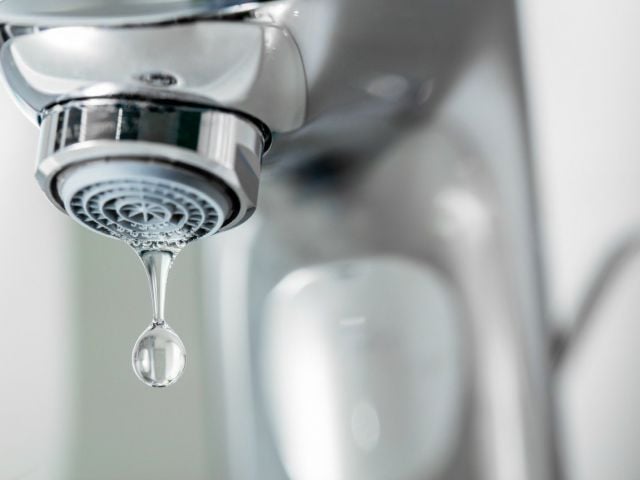
This week, EWG published a report and interactive map showing that the notorious “A Civil Action” chemical trichloroethylene, or TCE, pollutes the tap water supplies of 14 million Americans. TCE is a particularly harmful contaminant for children, with links to birth defects; damage to the brain, and the nervous, reproductive and immune systems; and increased risk of cancer.
“People whose water contains TCE can be exposed not just by drinking it, but also by inhaling it while bathing, washing dishes and doing other household activities,” said Tasha Stoiber, Ph.D., a senior scientist at EWG. “Communities across the country have water with potentially harmful levels of this toxic solvent, but many people don’t know about the risk they face when they turn on the tap.”
EWG also applauded the American Academy of Pediatrics Council on Environmental Health for publishing a new study warning of the risks chemical food additives pose to children’s health. On our new children’s health site, we counted down the top five food additives that all parents should avoid.
Over on the Shopper’s Guide to Pesticides in Produce™ site, we took a deep dive on neonicotinoid pesticides, which are banned in Europe, but still appear on American produce.
For coverage on these developments and more, here’s some news you can use going into the weekend.
TCE in Water
Fast Company: 14 million Americans are drinking carcinogen-polluted tap water
The drinking water of some 14 million Americans is contaminated with a cancer-causing industrial solvent called Trichloroethylene, or TCE, according to a new EWG analysis of tests from public utilities nationwide. EWG’s Tap Water Database, which aggregates test results from utilities nationwide, shows that in about half of the systems it monitors, average annual levels of TCE were above what some health authorities say is safe for infants and developing fetuses.
Marketplace (NPR): The EPA says TCE causes cancer, so why hasn't it been banned?
In a new report, the nonprofit Environmental Working Group estimates that TCE contaminates the tap water supplies of 14 million Americans. EWG had previously reported the presence of TCE in more than 300 drinking water systems in 36 states.
La Crosse Tribune: Environmental group warns of potential solvent in La Crosse water
The Environmental Working Group is drawing attention to the presence of TCE in 315 public drinking water systems that serve 14 million Americans. Reprinted by Winona Daily News.
MPR News: Report: Chemical found in drinking water of several Minn. communities
The Washington D.C.-based Environmental Working Group looked at data from 2010 though 2015, and found that the drinking water supplies in at least 15 Minnesota communities test positive for trichloroethylene, or TCE, though none exceed the federal limit of 5 parts per billion. Excerpt in MinnPost.
MPR News: Health Dept – Chemical in drinking water has dropped to safe levels in five communities
Using data from 2010-2015, the D.C.-based Environmental Working Group found trichloroethylene (TCE) in the drinking water supplies of 15 Minnesota communities, though only five exceeded the state limit of 0.4 parts per billion during that time.
Water Online: Notorious Cancer-Causing Solvent TCE Taints Tap Water For 14 Million Americans
Tap water supplies for more than 14 million Americans are contaminated with a cancer-causing industrial solvent made notorious by the book and film “A Civil Action,” according to an Environmental Working Group investigation released recently.
Delhi Greens: Cancer Causing TCE Tap Water Threatens the Health of 14 Million Americans
A recent analysis of water supply in United States by the Environmental Working Group has found that tap water supplies to more than 14 million Americans is contaminated with a cancer-causing industrial solvent TCE. TCE or trichloroethylene is linked to liver and kidney damage, and to cancers like leukemia. It has also been linked to birth defects, though the EWG fears that the American Environmental Protection Agency (EPA) will attempt to downplay important evidence that TCE exposure causes heart defects in developing fetuses.
Neonicotinoid Pesticides
Organic Authority: Bee-Killing Pesticides Found in Half of U.S. Produce Samples
A new analysis from the Environmental Working Group finds residues of at least one of three EU-banned neonicotinoid pesticides – imidacloprid, clothianidin, and thiamethoxam — on more than half of samples of potatoes, lettuce, and spinach tested between 2015-2016. More than a quarter of cherries, watermelons, and strawberries also tested positive for the chemicals.
Lead in School Water
"It’s really upsetting that to this day, the lead problem still exists in our country," Olga Naidenko, senior science advisor at the research and advocacy organization, Environmental Working Group, tells Romper. "The toxicity of lead has been known for a long time. This is not a new story."
Asbestos
Lost At E Minor: Trump’s face is being used as a seal of approval in Russia
“Vladimir Putin and Russia’s asbestos industry stand to prosper mightily as a result of the Trump administration’s failure to ban asbestos in the US,” said the president of the Environmental Working Group, Ken Cook.
Bug Repellent Guide
Business Insider: The best bug sprays and repellents you can buy
To learn more about which compounds are best for you and your needs, visit the Environmental Working Group's (EWG) page on insect repellents.
Cellphone Radiation
“These studies should have been done before more than 90 percent of Americans, including children, started using radio-frequency-based technologies and devices day in and day out,” said Olga Naidenko, a senior science adviser with the Environmental Working Group, a nonprofit in Washington, D.C.
Cleaners
Healthy Magazine: Homemade Laundry Detergent Recipe
Asthma, allergies, chemical burns, and poisonings are among some of the concerns associated with the chemicals in cleaning products as evaluated by a group of researchers known as the Environmental Working Group (EWG).
Cosmetics
Byrdie: 10 Pinterest Beauty Hacks You Should Definitely Avoid
Ethanolamine is normally used in detergents, polishes, and pharmaceuticals and is classified as toxic by the Environmental Working Group.
Skin Deep® Cosmetics Database
“Teenagers and young women are going through a period of adolescence and their hormones are active and rapidly changing… and so exposure to certain chemicals, endocrine-disrupting chemicals from these products, can wreak havoc,” said Nneka Leiba, director of healthy living science at the Environmental Working Group, a nonprofit that advocates against toxins in chemicals.
Mic: ‘Mic Dispatch’ episode 4: Candace Owens; beauty products’ toxic ingredients (Full transcript)
If you want to find out what’s in your makeup, you can go to the Environmental Working Group’s Skin Deep Cosmetics database. You plug in a brand and it’ll tell you what’s in it and if there are any concerns.
PopSugar: The 20+ Products That Turned Me On to "Safe" Makeup
To help make a "starter kit" of safe cosmetics, I turned to the Skin Deep database created by the nonprofit Environmental Working Group. EWG catalogs over 60,000 products and gives each a "hazard" score from 1-10, based on the ingredients. They screen for potential hormone disrupting chemicals, as well as ingredients that might cause allergies or irritation.
Art of Natural Living: Summer Skin Care and a Giveaway
Check out the Environmental Working Group’s (EWG) Skin Deep Database for more information and product ratings.
MultiBriefs: What spa clients are demanding now
Clients regularly consult the Environmental Working Group's website, study the Goop newsletters and watch their favorite TV doctors for advice.
Dirty Dozen Endocrine Disruptors
Mother Nature Network: 13 hormone-disrupting chemicals (and how to avoid them)
The Environmental Working Group (EWG) released one of its "Dirty Dozen" lists, this one with the goal of educating consumers about the worst offenders when it comes to endocrine-disrupters, or hormone-altering chemicals, commonly found in our environment and in our homes.
Shopper’s Guide to Pesticides in ProduceTM
Eat This, Not That!: 15 Things You Shouldn’t Do When Buying Produce
Step one: Study the Environmental Working Group’s Dirty Dozen(generally products with a thin skin). Step two: Read up on the Clean 15. Reprinted by MSN Philippines.
The Philadelphia Tribune: Tips to Be Fit: Avoiding pesticides in fruit and vegetables
The Environmental Working Group released an update to its annual “Dirty Dozen” and “Clean 15” lists. The lists rank produce with both the highest and lowest levels of pesticide residue, according to the group’s methodology. Reprinted by Bradford Era.
Sunscreens
Newsmax: Melanoma Rates Triple; How to Protect Yourself
“Sunscreen alone is not the magic bullet, “ Sonya Lunder, a senior analyst at the Environmental Working Group who holds a Master’s Degree in Public Health, tells Newsmax. “But it’s a good start. The problem is that many people are confused about what are the best protective products to buy.
Mother Nature Network: What you may not know about sunscreen
Healthy living watchdog Environmental Working Group has paid diligent attention to sunscreens as part of its comprehensive Skin Deep database. The group's top-rated sunscreens (the ones they consider healthiest) all contain physical ingredients. They recommend these as, “the right choice for people who are looking for the best UVA protection without any sunscreen chemical considered to be a potential hormone disrupter. None of the products contain oxybenzone or vitamin A and none are sprayed or powdered.”
Mom Does Reviews: Useful Guidelines for Sunscreen and other Skin Care Products during Pregnancy
According to the International Agency for Research on Carcinogens, titanium dioxide, when inhaled in considerable amounts in close to what is known as a “potential carcinogen.” It has made the Environmental Working Group suggest people reduce the usage of sprays.
The Virginia-Pilot: Things to know before sunbathing: SPFs, oxybenzone, broad spectrum and more
I checked online and found the health and environment advocate, the Environmental Working Group. The nonprofit watchdog group is concerned about the chemical’s effect on hormones in the body, and claims it threatens ocean eco-systems.
Environmental Working Group‘s 2018 Guide to Bug Repellents can help you find the right product for yourself and your family.
Superbugs Report and Label Decoder
Healthline: Do You Know What’s in Your Food’s Food? It May Be Harming Your Health
The Environmental Working Group (EWG) recently finished examining the amount of antibiotic-resistant bacteria in meat at some supermarkets in 2015. Their report states that superbugs were detected in nearly 80 percent of meats sampled.
1,4-Dioxane in Drinking Water
The Republic: Closed wells tested; firm searching for source of solvent in water
Environmental Working Group, a Washington D.C.-based nonprofit working on environmental issues, said that more than a million pounds of 1,4 dioxane was produced in the U.S. or imported to the country in 2015, and 675,000 pounds of the substance has been released into the environment nationwide.
PFAS in Drinking Water
According to a 2018 report published by the Environmental Working Group and researchers at Northeastern University, 15 million US residents are exposed to the chemicals. “We know that as we test more around the country, more sites are going to be identified,” David Andrews, a senior scientist at EWG, told BuzzFeed News.
Water Filter Guide
National Public Radio (NPR): Which Water Is Best For Health? Hint: Don't Discount The Tap
In a situation like that, there are quite a few filters that can remove lead from the water, according to the Environmental Working Group. Back in 2016, NPR created a test you can use to check if you have lead pipes in your home. If you want to investigate the safety of your water further, this tool can show you if your water is in compliance with federal drinking water standards.



